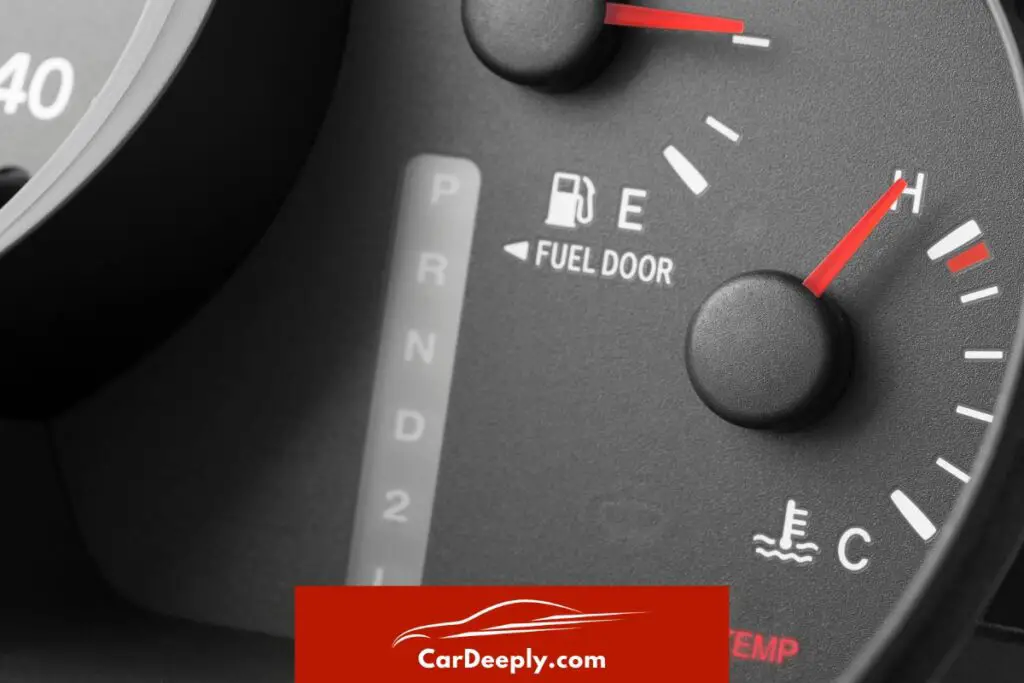Have you ever been stuck in a hot car with a blasting AC, yet the engine’s overheated?
It’s a nightmare. But don’t sweat it! We’ve got your back.
This guide will help you dodge common pitfalls, save time and money, and keep cool on the road. Dive in to discover:
- The real culprits behind the overheating.
- Spot-on symptoms of a faulty AC compressor.
- Practical, do-it-yourself fixes for an overheating car.
Let’s go!
Advertising links are marked with *. We receive a small commission on sales, nothing changes for you.
Key Takeaways

- The AC and cooling systems work together to prevent your car from overheating.
- Common causes of overheating include a faulty coolant sensor and AC compressor overload.
- Symptoms of a defective AC compressor include noise, warm air, and coolant leakage.
- Regular maintenance, including checking the cooling system and refilling coolant, can prevent overheating.
- If your car overheats while driving, turn off the AC, roll down the windows, and pull over safely.
Understanding the Basics of Car Overheating and AC Systems
Let’s start with the basics. Your car’s AC and cooling systems are like two best friends, working hand in hand to keep your ride comfortable and your engine cool.
But what happens when this friendship hits a rough patch?
Chaos ensues, and your car starts overheating when the AC is on.
The Role of the AC System in a Car
The AC system in your car is like your personal summer hero. It fights off the scorching heat, providing a cool and comfortable environment.
But it’s not just about comfort. The AC system also plays a crucial role in defogging your car’s windows during humid conditions.
The Role of the Cooling System in a Car
On the other hand, the cooling system is the guardian of your engine. It ensures the engine doesn’t get too hot, maintaining an optimal temperature for smooth operation. It’s like a personal trainer for your engine, ensuring it doesn’t overheat during its workout.
How AC and Cooling System Work Together
The AC and cooling systems are like a tag team. When the AC system is on, it generates heat, which the cooling system helps dissipate. They work together to maintain the balance of heat in your car.
But when something goes wrong in this partnership, your vehicle starts overheating when the AC is on.
Common Causes of Car Overheating When AC is On
Now that we’ve understood the basics, let’s dive into the common culprits behind your car overheating when the AC is on.
#1: Defective Engine Coolant Sensor
Think of the engine coolant sensor as the thermometer for your engine. It keeps a check on the engine’s temperature.
But if it’s defective, it might fail to trigger the cooling fans correctly, leading to overheating.
#2: AC Compressor Overload
The AC compressor is like the heart of your AC system. But if it’s overloaded, it puts extra pressure on the engine, leading to overheating. It’s like asking your heart to pump twice as fast.
#3: Faulty Water Pump
The water pump circulates coolant through the engine, keeping it cool. But a faulty water pump can disrupt this circulation, causing the engine to overheat.
#4: Faulty Fan, Fan Switch, & Fan Motor
The fan, fan switch, and fan motor are like the wind beneath your engine’s wings. They help cool down the engine. But if they’re faulty, they can’t provide the necessary cooling, leading to overheating.
#5: Clogged Condenser Fins
The condenser fins are like the lungs of your AC system. They help dissipate the heat generated by the AC. But if they’re clogged, they can’t do their job properly, leading to overheating.
So, there you have it. These are the common causes of car overheating when the AC is on. But don’t worry; we’ve got the solutions lined up for you in the next part.
Symptoms of a Faulty AC Compressor
Welcome back! Now that we’ve tackled the common causes of your car overheating when the AC is on let’s move on to the symptoms of a faulty AC compressor.
It’s like learning to read the signs your body gives you when you’re unwell.
Noise from Air Conditioner Compressor
First up, we have the noise from the air conditioner compressor. It’s like your car is trying to tell you something.
If you hear a grinding noise when your AC is on, it’s a clear sign that your compressor’s components are faulty.
AC System Blowing Warm Air
Next, we have the AC system blowing warm air. It’s like your AC has caught a fever. This is usually the earliest sign that your compressor is failing.
Compressor Clutch Not Moving
Then, we have the compressor clutch not moving. It’s like the engine of your AC system has stalled. If the clutch fails, the car’s cooling system will not engage properly, leading to overheating.
Burning Rubber Smell
Have you ever smelled burning rubber coming from your car’s AC? It’s like your car is sending you a distress signal. This could be due to the drive belt melting or wearing down.
Coolant Leakage
Finally, we have coolant leakage. It’s like your AC system is crying for help. If your compressor starts to over-compress coolant due to an internal fault, it can leak coolant.
How to Fix Engine Overheating When AC is On
Now that we’ve identified the symptoms let’s dive into the solutions.
Here’s how to fix your car overheating when the AC is on.
Checking the Cooling System
First things first, check your cooling system. It’s like giving your car a health check-up. Regular checks can help you catch any issues early on.
Refilling Coolant
Next, refill the coolant. It’s like hydrating your car. The coolant helps keep the engine cool, so it’s always topped up.
Checking Refrigerant
Then, check the refrigerant. It’s like checking the fuel for your AC system. If the refrigerant levels are low, it can lead to overheating.
Servicing the Air Conditioner
Remember to service your air conditioner. It’s like taking your car for a spa day. Regular servicing can help keep your AC system in top shape.
Parts Replacement
Finally, don’t shy away from replacing parts if needed. It’s like getting a transplant for your car. Sometimes, the only solution is to replace the faulty parts.
And there you have it! With these tips, you can keep cool on the road, even when the heat is on. Regular maintenance is key to preventing your car from overheating when the AC is on.
Frequently Asked Questions
Can running the AC continuously cause the car to overheat?
Yes, it can. Running the AC continuously puts a lot of load on the engine and the cooling system. If the cooling system isn’t up to the task, it can lead to overheating. It’s like running a marathon without taking breaks. It’s a good idea to give your AC some rest occasionally.
How often should I service my car’s AC system to prevent overheating?
It’s recommended to service your car’s AC system at least once a year. Regular servicing can help detect potential issues early on and prevent them from leading to overheating. It’s like going for an annual health check-up.
What should I do if my car overheats while driving?
First, turn off the AC and roll down the windows. Pull over safely and turn off the engine if the temperature doesn’t go down. Let the engine cool down before checking the coolant level. If it’s low, refill it. If the problem persists, it’s best to get your car inspected by a professional.
Can a faulty thermostat cause the car to overheat when the AC is on?
A faulty thermostat can cause the car to overheat when the AC is on. The thermostat controls the flow of coolant to the engine. If stuck closed, it can prevent the coolant from reaching the engine, leading to overheating.
Is it normal for the car to get slightly hot when the AC is on?
Yes, it’s normal for the car to get slightly hot when the AC is on. The AC system generates heat, which the cooling system helps dissipate. However, if the vehicle gets too hot, it could be a sign of a problem.

Sebastian loves convertibles and drove a BMW 335i for a long time (325 hp is just a dream). Today, with two children, he is more concerned with SUVs and family-friendly vehicles. In addition to an Audi A4 Avant, he also drives a Cupra Formentor VZ – even as a family man, you can’t do without speed. Get to know Sebastian better and visit the About Us page.
Advertising links are marked with *. We receive a small commission on sales, nothing changes for you.
